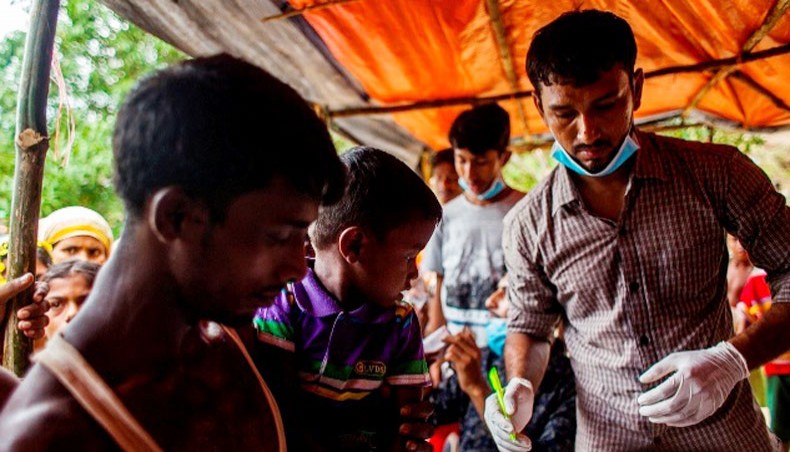Locals vulnerable to diphtheria outbreak among Rohingyas
Rapid spread of diphtheria among Rohingyas is turning into a matter of concern for locals as they are coming in touch with ethnic minorities for carrying out humanitarian assistance and others services.
‘So far we have found at least four suspected diphtheria patients in the local communities,’ Cox’s Bazar civil surgeon Abdus Salam told New Age on Wednesday.
These four suspected diphtheria patients came in touch with Rohingyas for different reasons, he said.
Locals coming in contacts with Rohingyas were vulnerable to diphtheria, a highly infectious respiratory disease that spreads through air from sneezing and or coughing or hand-to-hand and hand-to-mouth contact.
Bangladesh is planning to carry out a vaccination campaign among under-15 local children of Ukhia.
On Wednesday, World Health Organisation said a total of 2,440 suspected diphtheria cases, including 26 deaths, were reported from November 9 to December 25 among the Rohingyas who fled violence in Rakhine state of Myanmar to Cox’s Bazar.
Ukhia upazila health and family planning officer Misbah Uddin Ahmed said that they would hold a vaccination programme for all school-going under 15 children of the upazila on January 1 at respective schools to prevent diphtheria among locals.
‘We will also hold a vaccination programme for all under-five children with a door to door campaign after the vaccination programme,’ he said.
He said that they kept Rohingya diphtheria patients isolated to prevent spreading of the diseases.
Abdus Salam and Misbah Uddin both said that absence of coverage of diphtheria vaccination among Rohingyas and overcrowded living condition at camps were some major reasons for the spread of diphtheria among the ethnic minorities.
WHO in a statement on December 14 said that diphtheria outbreak among Rohingyas was evolving rapidly and spread among the local population could not be ruled out.
According to WHO, till December 12 a total of 804 suspected diphtheria cases, including 15 deaths, were reported among the displaced Rohingyas in Cox’s Bazar.
The first suspected case was identified on November 10, but health workers were unable to trace the patient. Another suspected case was found on November 19.
The Bangladesh government is association with aid group launched vaccination programme among the Rohingyas on December 12.
According to the UN estimation till Tuesday, 6,55,000 Rohingyas entered Bangladesh since the beginning of the new influx on August 25.
News Courtesy: www.newagebd.net











